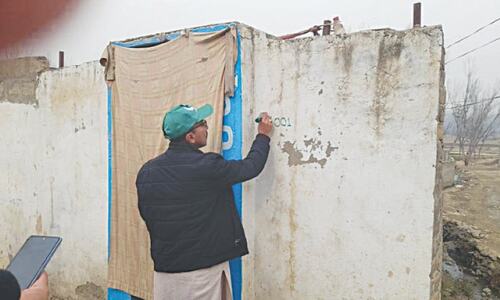ISLAMABAD: The Supreme Court on Tuesday ordered Attorney General Khalid Jawed Khan to get instructions from the federal government regarding a judicial commission’s report on the terrorist attack on the Army Public School (APS).
The deadly attack had left 140 people, including 132 children, martyred when militants stormed the APS in Peshawar on Dec 16, 2014.
A two-judge SC bench headed by Chief Justice Gulzar Ahmed had taken suo motu notice on complaints of the parents of the martyred children that the real culprits involved in the gruesome incident had not yet been arrested by the authorities.
Former chief justice Mian Saqib Nisar had on Oct 5, 2018 constituted the judicial commission and asked Peshawar High Court Chief Justice Waqar Ahmed Seth to nominate a senior judge of the high court to probe the APS attack. Justice Mohammad Ibrahim of the PHC had presided over the commission which prepared a 3,000-page report after recording the statements of around 132 people, including 101 witnesses, 31 policemen, army personnel and other officers, as well as the parents of the martyred children.
The attorney general is required to appear before the apex court after four weeks along with the federal government’s response to the commission’s report.
CJP says those responsible for the tragedy won’t be spared
During the hearing, the visibly disturbed parents of the martyred children pleaded for justice.
The chief justice assured the parents that those responsible for the tragedy would not be spared. He observed that the court realised the feelings of the parents and what had happened to them should not have happened.
When the parents requested for a copy of the judicial commission’s report, Justice Ijaz-ul-Ahsan observed that the report consisted of six volumes and was very sensitive. But the parents retorted that the report was not more sensitive than their children.
At this, the chief justice said even the court had not read the report and would decide what to do after getting response of the government, but added that the matter would be dealt with in accordance with the law.
Later, talking to the media outside the courtroom, the parents asked the government to devise a law under which the culprits involved in the incident should be apprehended. They complained that nobody was heeding to their grievances, adding that 150 families had been devastated as “we have lost our future generations”.
On Feb 13 this year, Ajnoon Khan, the father of martyred student Asfand Khan, had invited the attention of the Supreme Court to reports that Ehsanullah Ehsan, former spokesman for the banned Tehreek-i-Taliban Pakistan, had escaped from custody and fled the country.
In an application filed in the apex court, Mr Khan regretted that the families of the martyred people were traumatised and under severe shock after hearing that Ehsan had escaped along with his family from Pakistan after spending three years in captivity.
Addressed directly to the chief justice, the application raised a number of doubts, stating that these needed to be addressed to console the agonised mothers who lost their loved ones and are now living a completely shattered life. The application recalled how in 2017 Ehsan had surrendered voluntarily to the armed forces or he was captured as a result of a covert operation by security agencies.
What kind of agreement was reached with him, the application wondered, which made the terrorist to be kept alive for three years despite his confessional statement for being involved in the killing of the students and staff of the APS. How could he escape from the well-guarded custody, the application asked, wondering whether he was released with some conditions.
Why he was not tried in the court of law during these three years, the application asked, adding that the terrorist should be made answerable to the affected families of Shuhada-i-APS.
The application alleged that Ehsan was the mastermind of the APS carnage. He was not only the planner of the terrorist act, but also its financier who executed the attack as a result of which many people died and many suffered injuries.
The application has requested the apex court to put on notice the authorities concerned to explain why the state had failed to bring such a high-profile terrorist to justice.
Published in Dawn, August 5th, 2020














































Dear visitor, the comments section is undergoing an overhaul and will return soon.